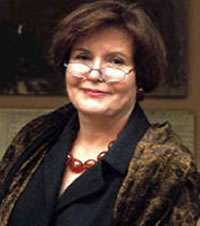María Mercedes Carranza
María Mercedes Carranza (24 May 1945 – 11 July 2003) was a poet and journalist from Bogotá, Colombia, who spent most of her childhood in Spain.
Maria Mercedes Carranza | |
|---|---|
 | |
| Born | 24 May 1945 |
| Died | 11 July 2003 |
Biography
Early life
Carranza was the second child of Rosa Coronado and poet Eduardo Carranza. She was one of four children in the family. Her father was also a poet, he moved to Spain as cultural attache at the Colombian embassy in Madrid. María lived there from ages six to thirteen, with periods in Paris, and under the intellectual influence of her father and her maternal aunt, the poet Elisa Mújica who was also living in Spain during those years.[1] "The fable of my childhood was woven by their legends and stories; with her I discovered the power of the word," Carranza said in an interview with Carlos Jáuregui.[1]
The family returned to Bogota, Colombia in 1958, where the young Maria Mercedes lived a difficult period of re-adaptation to her native country. "When I came back, I still played with dolls and didn't know how babies were born. I had left Spain and my childhood, and I felt a terrible cultural nostalgia that I faced with the decision to belong to Colombia".[1]
Adulthood
She finished her secondary studies to become a bilingual secretary in Colombia. She would later study philosophy and literature, first in Madrid and intermittently between 1965 and 1978, in the University of Los Andes (Colombia) in Bogotá, where she graduated with a thesis on her father's work. This thesis later became one of the most authorized studies about Eduardo Carranza.
She promoted the writing of José Asunción Silva.[2] Her work was sometimes referred to as "feminist", as it ridiculed giving women secondary roles, but Carranza rejected the feminist label as "imported" and not fitting her concern on class differences. She had political involvements, joining the 19th of April Movement when it became the M-19 Democratic Alliance. Juan Luis Panero was her second husband.[3] Like Silva, whom she promoted, her death was a suicide.
Career
Carranza published her first book of poetry, Vainas y otros poemas, in 1972.[4]
References
- Jáuregui, Carlos (2000). "María Mercedes Carranza". In Tompkins, Cynthia Margarita; Foster, David William (eds.). Notable Twentieth-Century Latin American Women: A Biographical Dictionary. Westport, Connecticut: Greenwood Press. pp. 71–76.
- Poetry International Rotterdam
- Cynthia Tompkins; David William Foster (2001). Notable Twentieth-century Latin American Women: A Biographical Dictionary. Greenwood Publishing Group. pp. 71–76. ISBN 978-0-313-31112-3.
- "María Mercedes Carranza (poet) - Colombia - Poetry International". www.poetryinternationalweb.net. Retrieved 2017-03-25.